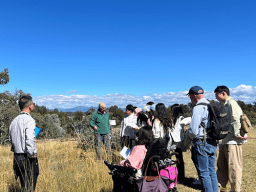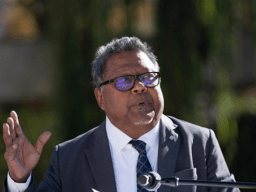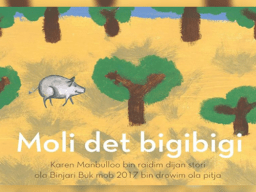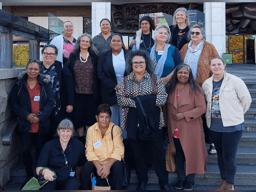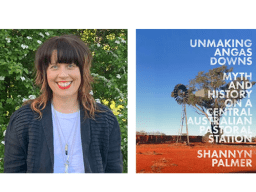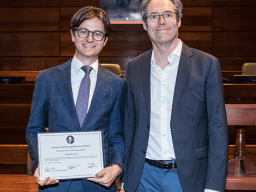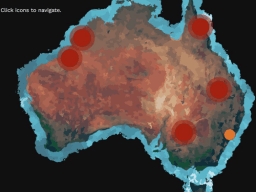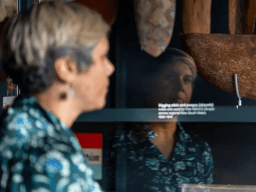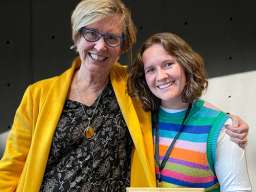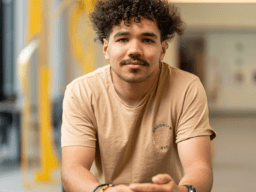National Reconciliation Week

National Reconciliation Week (NRW) is an annual observance from 27 May to 3 June. It is a time for all Australians to reflect on Indigenous histories, cultures and achievements and to consider how each of us can contribute to achieving reconciliation. The University believes we all have a role to play in reconciliation and seeks to foster and engagement with important conversations about reconciliation.
The NRW theme for 2024, Now More Than Ever, is a reminder that no matter what, the fight for justice and the rights of Aboriginal and Torres Strait Islander people will – and must – continue.
Explore achievements, opportunities and events at ANU this NRW.
- CASS Student’s working towards reconciliation
- Workshops
- Recent Reads from CASS Academics
- Referendum Reporting
CASS Student & Alumni Work
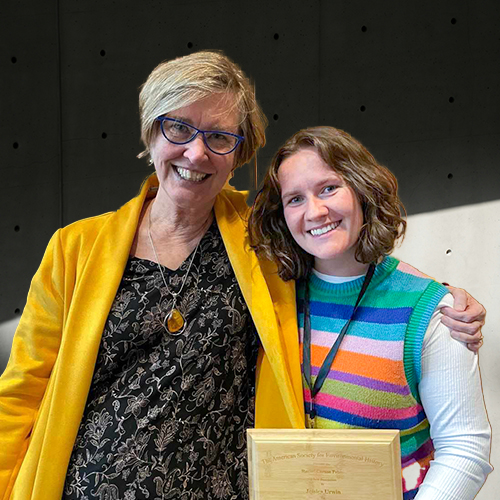
Dr Jessica Urwin
Dr Urwin has won the American Society of Environmental History’s (ASEH) Rachel Carson Prize for Best Dissertation.
Her thesis, “sought to chart the first history of ‘nuclear colonialism’ in Australia, exploring the entwined histories of three nuclear processes—radium and uranium mining, nuclear testing, and radioactive waste disposal—and their relationship to Aboriginal communities and their politics over the 20th century. It demonstrated that Australian nuclear processes have been historically pursued in the name of national development, geopolitics, and imperial power, facilitated through existent and adaptive colonial mechanisms, and shaped powerfully by Aboriginal peoples and their politics.”
This award has never before recognised a thesis on an Australian topic.
Read more about her research here.

Archie Horneman-Wren
ANU Arts-Law student Archie Horneman-Wren has won the Francis Forbes Society's 2023 Australian Legal History Essay Competition.
Archie won in the Tertiary category, an award offered annually by the Society to ‘recognise excellence in the study of Australian legal history’ for his winning essay, titled, “'The Facts as We Know Them Today': Law, Narrative, and the Mabo Decision as an Exercise in Australian Historiography’”.
An extract from his winning essay reads: 'The Mabo decision proved that Australian law and history are mutually inclusive. If it were not for history’s proper understanding of Australian settlement, Mabo would never have overturned terra nullius. And, if it were not for Mabo, neither legal nor historical scholarship would have possessed the requisite authority to speak about Australian nationhood with a new direction. Mabo gave both disciplines the narrative foundations necessary to conceive of our future on new (or ancient) grounds, from which Indigenous peoples had never disconnected.’
Read more here.

Hunter Culbong
Since 2019, ANU has awarded funding to 56 Kambri Scholars thanks to its partnership with Wesfarmers Limited. Hunter Culbong, a Noongar man is the first graduate of the program. He completed his Bachelor of Criminology (Honours) in 2022 and is currently completing his PhD.
“The Kambri Scholarship has been incredibly important to me. It’s the reason I decided to come to the ANU,” Mr Culbong said.
Read more here.
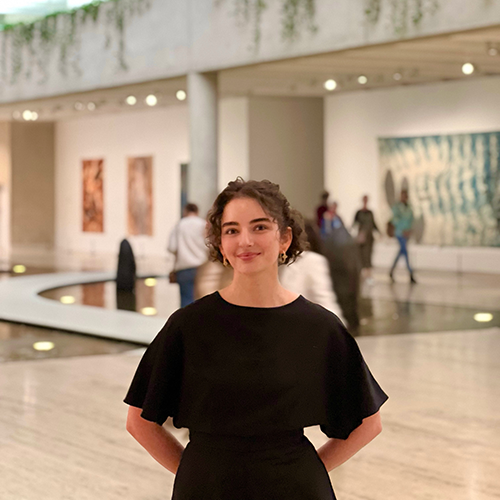
Madalyn Grant to undertake PhD as a 2024 Gates Cambridge Sholar, to address a significant oversight in the field of cultural repatriation
“There’s a lack of primary data on the emotions of non-Indigenous professionals involved in repatriation processes, a gap that affirms the idea that Indigenous peoples make ‘subjective’ or ‘emotional’ cultural claims for return despite the ‘rationality’ of further research or display. Yet, those arguing for retention often do so in highly emotive ways. I’m keen to address this gap, to harness findings on the nature, role, and impact of emotions and use that to inform best practice. I believe that doing so may facilitate greater opportunities for inter-community reconciliation.”
Read more here.

CASS alumna, Shannyn Palmer receives Prime Ministers Literary Award for Unmaking Angas Downs
Shannyn Palmer PhD ‘17, a distinguished alumna of the College of Arts and Social Sciences (CASS) at the Australian National University (ANU), is the recipient of the 2023 Prime Minister's Literary Award for Australian History for her book, Unmaking Angas Downs:Myth and History on a Central Australian Pastoral Station. Published in 2022, Palmer's work offers, “a history of colonisation in the southwest of Central Australia and uses the station as a lens to tell that story,” she explains.
Read more here.
Workshops & Events

RCDH Indigenous Family Research and Writing Skills Workshop
Facilitated by Dr Shauna Bostock and National Library of Australia staff, the two-day workshop at ANU welcomed 14 Indigenous women interested in building their skills in family history research and writing, aiming to kickstart their research journey.
Read more about the workshop here.

Indigenous Knowledge of Land-Sharing Heritage, Exchanging Stories
This workshop explored how Indigenous knowledge of the land goes beyond our perceptions of culture and nature when we visit a place and connect with people.
One participant said: "Today was an excellent and inspiring experience. We explored Canberra's history through a tour of its natural areas. We learned new things like the kangaroo's ability to sense grass and trees producing oil during hot weather. Bill's discussion about the environmental impact of colonization was thought-provoking, emphasizing the importance of respecting indigenous knowledge and learning from indigenous communities."
Read more.

Living City: People, Plants and Place
An inspiring start to a new visual arts and design program, working with Canberra’s suburban communities and our many urban natural environments: from micro-forests to suburban wetlands, nature reserves and parks.
This community led workshop provided an opportunity for participants to work with Gawari Mada, a micro-forest, food forest and nature play area within suburban Holt, Canberra. At our first gathering, we were joined by Tyronne Bell, Ngunawal traditional owner and elder, as well as local community members and ANU School of Art & Design academic staff.
Read more.

Marking Country Map Launched at the New Australian Embassy in Washington DC
Ambassador of Australia to the United States, Kevin Rudd AC hosted ANU Professors Ann McGrath and Jackie Huggins AM FAHA to launch the Marking Country map on 4 October 2023. This was the first launch event of its kind held in the new Australian Embassy building in Washington DC.
The interactive map shows the deep history stories of Indigenous community groups across Australia through a different kind of temporal ontology called an ‘Everywhen.’ It is important for users to approach the Marking Country site leaving behind a traditional western perception of ‘history.’ Ambassador Rudd opened the event by sharing profound insights about Indigenous history. Later, while reading Laura Rademaker’s chapter in Everywhen, Rudd also noted a special interest in how Indigenous people make their own meanings and draw parallels between their own temporal conceptualisations and Christian time/ Indigenous time
Read more here.
Recent Reads from CASS Academics

‘Care is in everything we do and everything we are’: the work of Indigenous women needs to be valued
Authors: Elise Klein, Associate Professor ANU, Chay Brown, Managing Director, Her Story Consulting & Postdoctoral fellow, ANU, Janet Hunt, Honorary Associate Professor, CAEPR, Australian National University, Kayla Glynn-Braun, Director of Her Story, project coordinator at The Equality Institute, lead on U Right Sis? project, Indigenous Knowledge, Zoe Staines, Senior Lecturer, The University of Queensland
Read here.
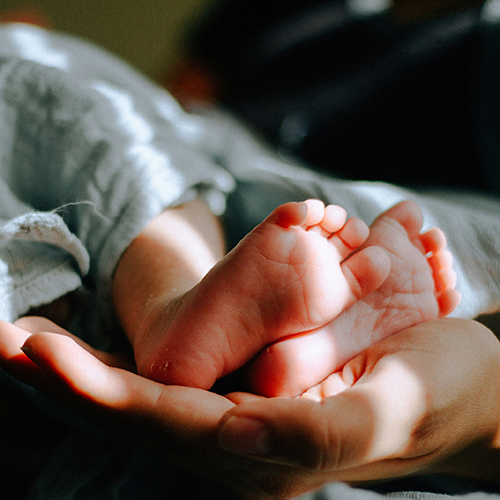
Friday essay: ‘too many Aboriginal babies’ – Australia’s secret history of Aboriginal population control in the 1960s
Authors: Laura Rademaker, ARC DECRA Research Fellow, Australian National University, Jakelin Troy, Director of Aboriginal & Torres Strait Islander Research Office, University of Sydney, Julia Hurst, Faculty of Arts Indigenous Postdoctoral Fellow, Indigenous and Settler Relations Collaboration, The University of Melbourne.
Read here.

Dr Jilda Andrews is reimagining the future of museums
Dr Jilda Andrews is breathing new life into museum artefacts —illuminating inclusive futures for Indigenous cultural heritage worldwide by exploring the troubled past.
Read more here.

Now more than ever: Peter Yu’s lifelong commitment to First Nations Australians
Since childhood, Professor Peter Yu has been aware of the gaps that exists for First Nations people. With an extensive career of inciting change, he isn’t slowing down now.
Read more here.
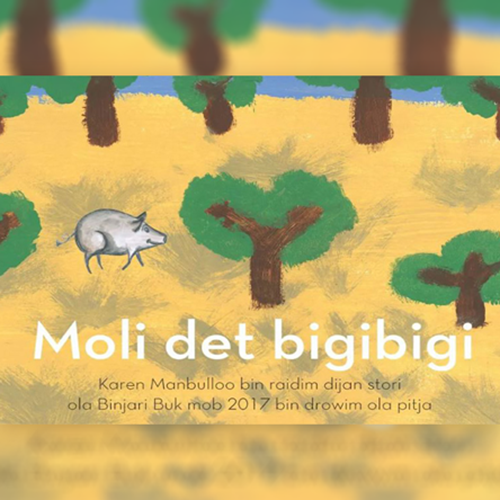
A quest to make Kriol count
Linguistics expert Dr Denise Angelo didn’t expect to find joy in drawing a small pig with a penchant for Weet-Bix.
But she says her involvement in illustrating and providing linguistic know-how for the Indigenous and bilingual picture book Moli det bigibigi (Molly the pig), by Kriol-speaking author Karen Manbulloo, is one of the most enjoyable roles she’s had.
Angelo, an early career researcher and teacher based at The Australian National University (ANU) whose work focuses on shining a light on Indigenous languages in Australia, has been awarded the Academy of the Social Sciences in Australia 2023 Paul Bourke Award for her collaborations with Aboriginal and Torres Strait Islander educators and communities.
Read more here.
Referendum Reporting

Democracy Sausage: Divided nation — the Voice vote explained
Researchers Nicholas Biddle and Valerie Cooms join the show to discuss new research on the referendum and why it was rejected at the polls.
Detailed analysis of the 2023 Voice to Parliament Referendum and related social and political attitudes
Author/editor: Biddle,N, Gray, M, McAllister, I & Qvortrup, M
Year published: 2023
Read here.
